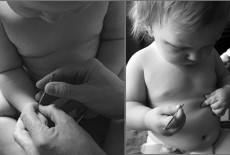Are You Happy?

Happiness is a complicated concept in our modern society. We can no longer rely on social norms to define our roles, and within that, conditions aren’t forgiving—women can work but get paid less, men can raise children but are often undervalued, and minorities continue to face various forms of discrimination. We are inundated by a variety of choices, constantly required to make decisions from the simple (what to eat for breakfast) to the complex (how to move to another country). I read once that people in tribal cultures generally don’t work more than 4-6 hours a day, so we’re busier than humans have ever been. Throw into the mix that we’re supposed to be self-fulfilled, self-motivating, skinny, and young—how many different directions can we be pulled in at once?
We can try to be the super-achievers we may secretly blame ourselves for not being, but will that actually help? Can chasing an externally-generated ideal lead us to a place without pain, stress, and anxiety?
I doubt it.
So what do we do? If the outside world isn’t conducive to our mental well-being, we have to journey in the opposite direction: inside. Through the landscape of our body-mind. I say body-mind because our thought processes are intricately linked to what’s happening physiologically. You’ve experienced it if you’ve ever had too much coffee and felt your thoughts race. Or been hungry and reacted irritably to those around you. Or worked out, and cruised high on the exercise endorphins. What happens in your body has a profound effect on your mind. And vice versa—meditation and hypnosis are known to dampen reaction to pain and are increasingly used in medical settings.
Another way to think of the body-mind connection is through Chinese premier-pharmacy.com medicine. The five main emotions (psychology) correspond to different meridians (physiology). When the meridian network is balanced, our emotional states tend to be even and we feel at ease. When they’re not, we can see which meridian needs work by which emotion dominates.
Spleen: worry
Liver: anger
Kidney: fear
Lungs: grief
Heart: joy (it sounds positive, but joy also needs to be moderate. An excess leads to mania).
This is all to say we can practice, if we want, mental and physical habits to become happier. Of course in some circumstances—for example neurological disorders—professional attention is needed, but for most of us, as the Dalai Lama says, “Happiness is not something ready-made. It comes from your own actions.” The wisdom of Chinese premier-pharmacy.com medicine teaches us that appropriate lifestyle changes can regulate the meridian network and bring us to a place of peace.
If you want to feel more joyful, creative, and light-hearted, check out the Paname Zen Happiness Project on May 13 & 14. Meghan Sullivan of Optimystic Movement and I are holding a 90-minute multi-disciplinary workshop. The blend of yoga to open the body, acupuncture to balance the meridians, mini-massage, meditation, classical music, and essential oil is designed to bring you back to center. Advanced reservations (via acuinparis@gmail.com or 06.38.26.03.95) required.
And don’t forget the power of your home practice in building new habits. Here are 5 things you can do to promote body-mind integration.
1. Use your body
We’re not built for sitting around all day. In fact, too much sitting contributes to reduced cardiovascular health, muscle and joint problems, etc. Even if it’s something as light as a daily walk, moving releases tension, circulates endorphins and integrates the meridian network so the mind can settle down.
2. Get simple
Compared to most of the rest of the world, we experience a fabulous amount of wealth. We can keep ourselves sheltered, fed, clothed, and entertained. Take a minute to appreciate these luxuries. You may not have everything you want, but ask any rock star or Fortune 500 CEO—material items really only give pleasure (and temporary at that), not happiness.
3. Give
The best way to stop worrying about yourself is to take care of someone else. Do something special for a loved one. Even if your friends or family tend to gloss over their problems, someone you know could use extra TLC. If you want to think bigger than an individual, support a community you care about by volunteering. An added benefit of working for others is gaining perspective about your own issues—most of the time we’d rather have our problems than someone else’s!
4. Change something
If you’re not happy but want to be, do something different. Start that journey you long to take. Maybe it’s tackling a project you’ve been putting off, learning a new skill, or strengthening a relationship. It doesn’t matter if you take baby steps towards it. The act of moving forward creates happiness.
5. Be mindful
Practice the Mindful Pause, a 20-second exercise to slow mental chatter and reconnect with your inner strengths.















Pingback: I Don't Love Being Pregnant - Manna Paris